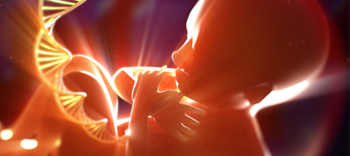Parent's Corner > Risk Factors > Genetics
Genetics

Genetics play a strong role in the development of Autism Spectrum Disorders (ASDs). Autism is shared among 50-70% of identical (monozygotic) twins, compared with 0-10% of fraternal twins1,2,3. Moreover, 1-6% of children diagnosed with autism also have a sibling who is diagnosed with autism, a much higher rate than the general population4.
Further evidence for a genetic risk for autism comes from well-defined genetic disorders such as Fragile X syndrome, where a significant proportion of affected individuals develop autism5. Autism in these cases is known as syndromic autism due to its link with a particular syndrome.
Key Points
- Twin- and family-based studies show that autism is highly heritable.
- Autism affects predominantly males, with an estimated male to female ratio of 4:1.
- Autism is known as a complex genetic disorder since many different underlying genetic defects can cause the disorder.
- Some of the genetic risk factors associated with autism include: rare single gene mutations, common variants in susceptibility genes, and chromosomal abnormalities such as copy number variations (CNVs; see below).
Misconception
- Autism is caused by mutations in only one gene.
Fact
- ASD is thought to be caused by a combination of genetic and environmental factors. To date, variations in almost 300 genes have been associated with Autism Spectrum Disorders, and these explain less than 10% of individuals with autism.
Read about other misconceptions.
| References: |
|

